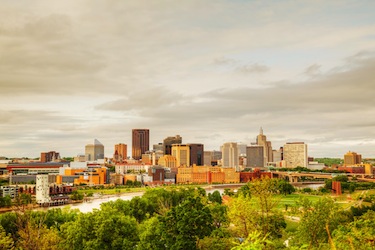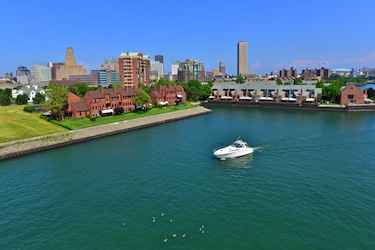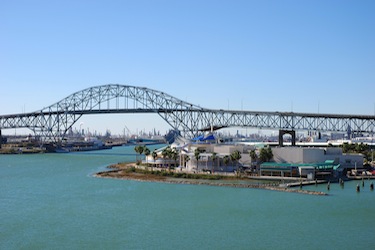Regardless of what side of the fence you are on for celebrating Earth Day (although the grass is sure to be greener on the other side), there are select cities across the country that take the extra initiative to ensure we are taking care of the planet.
NerdWallet took a closer look at the cities with the highest level of green living, measuring environmental quality and green transportation.
Environmental quality factors in the median air quality for each city, with the lower the AQI, the better. Additionally, it looked at the number of parks per 10,000 residents.
Green transportation calculates the percentage of the population that walks, bikes, carpools, takes public transportation or works from home from each city. It also assessed the excess fuel consumed per commuter, which is wasted due to congested conditions in the city.
Of the 95 largest cities in the U.S. considered in the analysis, here are the top 10 greenest cities.
10. Minneapolis, Minn.
Minneapolis is home to 92 miles of on-street bikeways and 85 miles of off-street paths, making it one of the best biking cities in the nation. The city is also home to several green groups, including Minnesota Renewable Energy Society, a nonprofit organization that has promoted the use of renewable energy since 1978.
Overall the city posted a final score of 52.62, with a median air quality of 45, 4.7 parks per 10,000 residents and 12 gallons of excess fuel consumed per commuter.
9. New Orleans, La.
New Orleans has taken new action to rebuild a green environment since Hurricane Katrina passed. The city now offers 200 parks sprawling over 2,000 acres. Overall the city posted a final score of 52.66, with a median air quality of 45, 6.7 parks per 10,000 residents and 13 gallons of excess fuel consumed per commuter.
8. St. Paul, Minn.
Now to the other half of the Twin Cities, St. Paul hosts more than 20 buildings that are certified by Leadership in Energy and Environment Design, which identifies the world’s greenest and most energy-efficient buildings. Plus, the city is overflowing with more than 170 parks and open spaces and 100 miles of trails. As a result, the city posted a final score of 52.92. a median air quality of 45, 6.5 parks per 10,000 residents and 12 gallons of excess fuel consumed per commuter.

7. Cincinnati, Ohio
It is no surprise that Cincinnati is on the list, especially since in 2012 it became the largest city in the U.S. to provide 100% renewable electricity to its residents and continues to use green energy today. On top of this, Cincinnati has 70 neighborhood parks, 34 nature preserves, and one of the largest public plant conservatories. This data accrued to a final score of 52.93, a median air quality of 54, 10.9 parks per 10,000 residents and 18 gallons of excess fuel consumed per commuter.
6. Buffalo, N.Y.
There are more than 180 parks and recreational facilities in Buffalo, giving it the nickname the “City of Trees.” Currently, the city’s land use and zoning policies are in the midst of a historic revision under a process called the “Green Code,” which will guide the city’s development over the next 20 year and aims to improve the environment and create a more sustainable community. For now, the city boasts a final score of 53.33, a median air quality of 41, 7.7 parks per 10,000 residents and 18 gallons of excess fuel consumed per commuter. Meanwhile, 32.6% of the population works from home, walks, carpools, bikes or takes public transit to work.

5. Greensboro, N.C.
In order to place fifth on the list, Greensboro’s local government created land use policies to protect open spaces and installed a variety of energy-efficient equipment and appliances. The city recorded a final score of 53.72, a median air quality of 38, 6.9 parks per 10,000 residents and 12 gallons of excess fuel consumed per commuter.
4. Rochester, N.Y.
The city started the Project Green plan to enhance its residents' quality of life by converting a great deal of city space into green infrastructure such as gardens, parks and renewable-energy generating facilities. The city posted a final score of 57.33, a median air quality of 36, 7.2 parks per 10,000 residents and 13 gallons of excess fuel consumed per commuter.
3. Corpus Christi, Texas
As the city furthest south and right next to the Gulf of Mexico, Corpus Christi provides a vast array of water recreation activities and nature tourism. In addition, the city has 2,100 acres of developed and undeveloped park space, including beaches and natural habitats. This all added up to the city reporting a final score of 59.02, a median air quality of 39, 7 parks per 10,000 residents and 6 gallons of excess fuel consumed per commuter.

2. Anchorage, Alaska
In the complete opposite direction, Anchorage has over 40% of the state's population. Most notably, the city has one of the lowest AQI’s in the country. Anchorage noted a final score of 65.91, a median air quality of 29, 7.8 parks per 10,000 residents and 8 gallons of excess fuel consumed per commuter.
1. Madison, Wis.
The greenest city in U.S. holds the title mostly because it is literally green. It has 12.7 parks per 10,000 residents — the highest mark of all cities in the country. Plus, the city contains more than 15,000 acres of lakes and more than 200 miles of biking and hiking trails. The city won with a final score of 73.52, including a median air quality of 41 and 10 gallons of excess fuel consumed per commuter.





